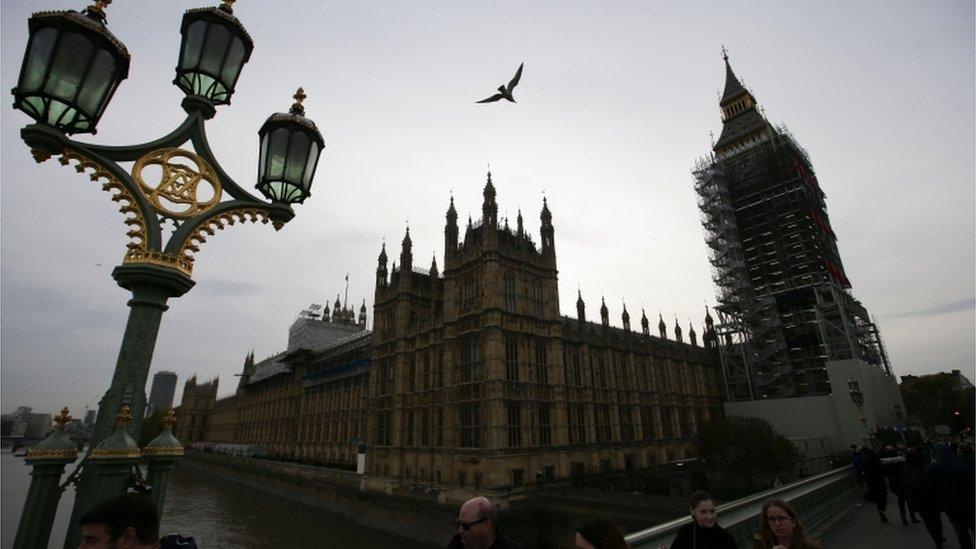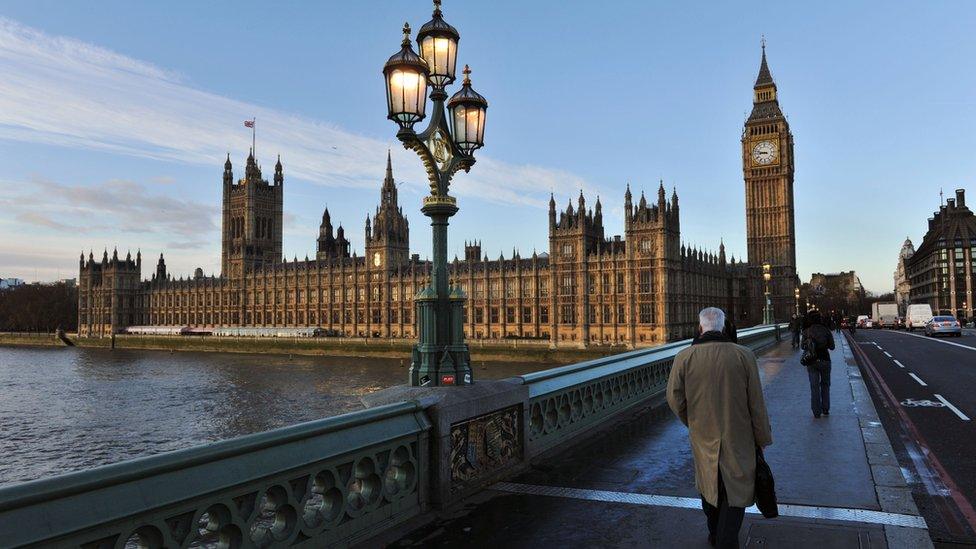House of Lords staff 'bullied and harassed', report finds
- Published

A report into the culture in the House of Lords has found that staff were "bullied and harassed" by peers.
An inquiry conducted by Naomi Ellenbogen QC, external said "unacceptable behaviour" by "known offenders" in the House of Lords had been tolerated.
The report documented complaints of inappropriate touching and haranguing behaviour.
Lords Speaker Lord Fowler said "bullying and harassment" had no place in the House.
The inquiry was launched in 2018 after allegations of bullying and harassment in Parliament hit the headlines.
'Unworthy'
Publishing her report, Ms Ellenbogen wrote: "The prevailing culture and behaviours in the House of Lords, as a place of work, have not been conducive to an open and supportive culture to ensure that all those working there are treated with dignity and respect.
"Staff have bullied and harassed other staff. Members have bullied and harassed staff.
"On the whole, staff who have experienced bullying and harassment have tended not to complain, formally or otherwise, in the belief that nothing will happen and/or for fear of reprisal.
"The existence of this culture is unworthy of any institution."
She wrote there existed in the House of Lords "a culture of undue deference, fear and hierarchy that has put members and clerks at the top, and everyone else below".
According to the report, that meant "staff can become institutionalised, bad habits can become entrenched, poor behaviour can go unchecked, urban myths can develop and beliefs which may once have been justified can survive and flourish when no longer warranted."
The report found that 20% of staff had reported experience of bullying or harassment - nine points higher than the level across the civil service, but only marginally higher than in the House of Commons.
The inquiry took 180 contributions from staff who had worked for the Lords within the past six years.

Naomi Ellenbogen QC has made 19 recommendations to improve the Lords' culture
The report said it received "very few contributions" relating to sexual harassment, but added: "The status of those of whom the behaviour was alleged were, however, particularly troubling."
Examples of harassment included one peer grabbing someone's bottom and another trying to kiss a staffer.
Some female contributors provided accounts of comments made by "male (usually senior) colleagues including 'gosh, you look grown up'".
Known offenders
The report did not name the alleged perpetrators, but noted that "with depressing predictability, the same members of the House were named by contributor after contributor as 'known offenders'".
Of one peer a contributor said she "is parliamentary royalty in many people's minds - never meet your heroes, I've decided. She has a reputation, but she's untouchable. She is very rude and no-one knows how to deal with her."
Another described a different peer as "awful to the staff - hideous, rude and haranguing over basic information".
A recurrent theme identified by the report was the difference in treatment between clerks and other employees.
One contributor said: "Clerks are favoured in every aspect and behave inappropriately without repercussions, with other staff being sidelined on important decisions regarding their work, scapegoated to protect clerks' reputations and generally made to feel inferior in a multitude of other ways."
Clerks are involved in the running of parliamentary business, including providing advice on procedural matters and maintaining records of proceedings.
Institutionalised
One contributing factor to the workplace culture identified by the report was politeness.
The report suggested that politeness could "hinder people's willingness to engage in straightforward, constructive and courageous conversation", particularly in relation to difficult subjects.
Ms Ellenbogen even suggested that, in her own dealings with the House of Lords, "courtesy was proffered as a substitute for the substantive information requested, in the hope (possibly subconscious) of masking its absence, or reducing the risk of any negative conclusion that I might draw."
She also said while the length of service of many staff had positive aspects, it also meant employees "have tended to become institutionalised, partly because 'this is the way that things have always been done'."
She suggested modernisers either "tend to leave, when their ideas are knocked back, or get drawn into the traditional way of doing things (whether by choice or subliminally) in order to progress through the ranks".
Recommendations
The report calls for "root and branch reforms" to tackle "systemic cultural issues", and makes 19 recommendations focused on changing "the various toxic behaviours" and improving "the options available to address inappropriate behaviour".
The recommendations include compulsory training for both members of the House of Lords and their staff, the creation of a unified cross-parliamentary human resources team, and the appointment of a director general of the House of Lords.
Lord Fowler said the report was "an important step" towards ensuring that bullying and harassment were eradicated from the institution, and the House of Lords Commission would consider Ms Ellenbogen's recommendations.
The inquiry - which started last year - was instigated by the House of Lords Commission. It came after a damning report by High Court judge Dame Laura Cox found lewd, aggressive and intimidating behaviour by MPs and senior House of Commons staff had been "tolerated and concealed" for years.
A report into the treatment of those employed by MPs, rather than House of Commons staff, is due to be published on Thursday.
A Downing Street spokesman said "it is really important that the House leadership responds fully and properly to the concerns in today's report."
- Published15 October 2018
- Published22 October 2018

- Published5 November 2018
